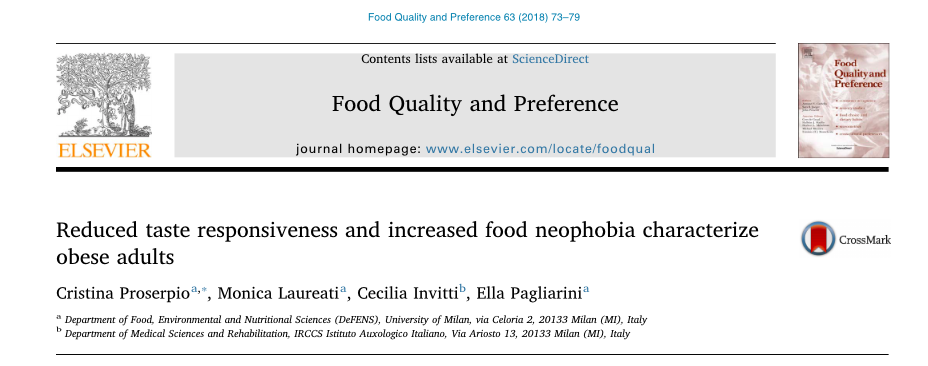Proserpio, C., Laureati, M., Invitti, C., & Pagliarini, E. (2018). Reduced taste responsiveness and increased food neophobia characterize obese adults. Food Quality and Preference, 63, 73-79.
https://doi.org/10.1016/j.foodqual.2017.08.001
Abstract
The aim of the present study was to investigate the relationship between two well-established markers of taste perception, 6-n-propylthiouracil (PROP) responsiveness and fungiform papillae number, in obese and healthy-weight subjects. The association between taste responsiveness and food neophobia attitude was evaluated to understand if these variables are linked to nutritional status of subjects.
Forty healthy-weight (Body Mass Index: 22.67 ± 0.43 kg/m2) and forty-five obese (Body Mass Index: 37.57 ± 0.77 kg/m2) subjects were involved. PROP responsiveness and fungiform papillae number were positively correlated to each other in both groups of subjects (healthy-weight: r = 0.67, p < 0.001; obese: r = 0.83, p < 0.001). PROP responsiveness ratings and fungiform papillae number were significantly negatively correlated with food neophobia scores in both group of subjects (p < 0.01). Subjects characterized as significantly less sensitive and more neophobics had a higher Body Mass Index. Especially, obese men showed significant lower taste responsiveness (p < 0.05) and higher food neophobia scores (p < 0.05) compared to obese women and healthy-weight subjects, both sexes.
The nutritional status of the subjects seems to be linked to taste responsiveness and food neophobic attitude. These data suggest that, between several factors which could play a role in the control of body weight, understand how sensory perception affects eating behavior could give important information to study variables which may determine food habits.
Keywords: PROP; Fungiform papillae; BMI; Overweight; Sensory perception; Eating behavior
© 2017 Elsevier Ltd. All rights reserved.

Hello there! This is my first visit to your blog! We are a team of volunteers and starting a new project in a community in the same niche. Your blog provided us useful information to work on. You have done a marvellous job!
Excellent blog post. I definitely love this website.
Thanks!
I was more than happy to find this site. I need to to thank
you for ones time due to this wonderful read!!
I definitely appreciated every little bit of it and I have you book marked to check out new information on your website.
This is the perfect blog for anybody who hopes to understand this topic.
You know so much its almost tough to argue with you (not that I really will
need to…HaHa). You certainly put a new spin on a
topic that’s been written about for ages. Great stuff, just great!
Appreciation to my father who stated to me concerning this website, this webpage
is really amazing.